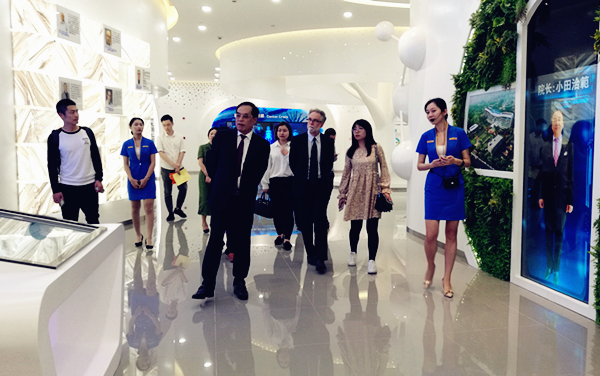
Gregg L. Semenza (C) visits a research center at the Boao International Hospital on Dec 1. [Photo provided to China Daily]
Gregg L. Semenza, a member of American Academy of Sciences and fellow of the US National Academy of Medicine, signed an agreement with the Boao International Hospital to establish an academician workstation in the Boao International Medical Tourism Pilot Zone on Dec 1.
Dr. Semenza is a professor of pediatrics, radiation oncology and molecular radiology, biochemistry, medicine and oncology at Johns Hopkins University School of Medicine. He was one of the founders of the American Academy of Medical Genetics. He is best known for his breakthrough discovery of HIF-1 (hypoxia inducible factor-1) protein, which controls genes to respond to changes in oxygen availability.
The findings are of far-reaching significance for understanding and treating hypoxic health conditions such as coronary artery disease and tumor growth. The Lasker Award is the most prestigious biomedical award Semenza has received, among other awards.
Semenza said that he was honored to be invited to be chief scientist for the Boao International Hospital, a general hospital which is equipped with cytology laboratory and molecular biology laboratory which meet the GMP standards.
He said he was excited to see the most modern facilities and the most modern techniques that are ready to treat difficult human diseases in such a beautiful place in Boao and he will be very happy to provide all of their research techniques in stem cell therapy.
Professor Semenza will recommend high-level international talents to the hospital and help medical teams at Boao International Hospital to "go out" for overseas training, in a bid to advance the frontier research of biology, genetics and genomics, and find solutions to related diseases to bring benefits to more Chinese patients, according to officials at the hospital.
Launched as a national demonstration project in 2013, Boao Lecheng International Medical Tourism Pilot Zone has been granted nine special preferential policies including special permission to import medical technology, medical equipment and medicine, and cutting-edge technological research on stem cells.